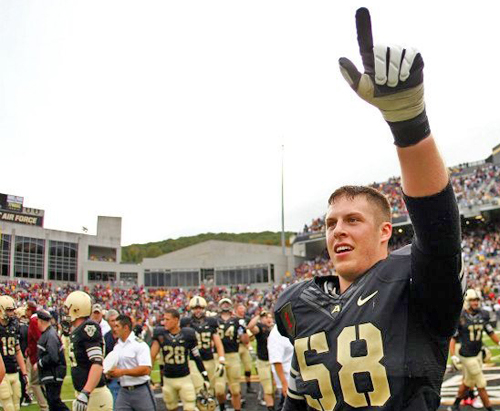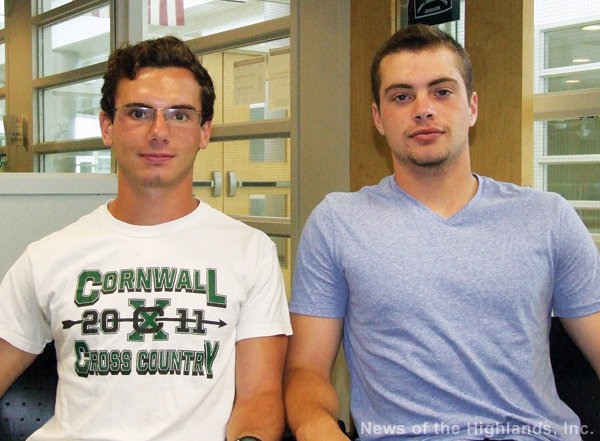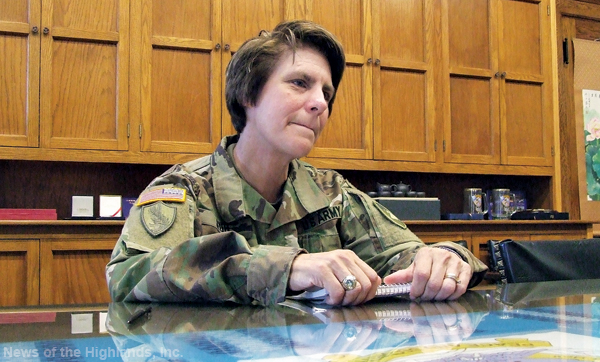
During football season, Thursday nights were special at West Point. The players and the cadets would gather for a spirit dinner. It was the one time during the week when they weren’t in uniform. And the food was better than what they’d get on other nights. When the meal was finished, the football team would lead a procession out of the dining hall. Before the Air Force game, the student body burned a giant airplane. Before the contest with Navy, the cadets ignited a big ship. 2Lt. Ben Jebb believes the ship might have been real.
A resident of Cornwall, the second lieutenant graduated from the United States Military Academy last month. He is enjoying a rare two-month break before he reports to Fort Benning, Ga. in July for an Infantry Basic Officer Leadership Course. He can’t remember ever having this much free time. (When he finished high school, he had a two-day break before he reported to “Beast Barracks.”)
The recent graduate was a tackle on offense for the football team. He lettered as a junior, and became a starter as a senior. More than most of his classmates, Ben had an idea of what to expect when he entered the academy. His parents (Joel and Cindy) were both Army officers. Ben and his family lived on campus while he was attending elementary school.
“As a third or fourth-grader, you think that being a cadet is the coolest thing around.”
Of course, his perspective changed a little when he put on the uniform. “As a third or fourth-grader,” he recalled during an interview, “you think that being a cadet is the coolest thing around. When you get to West Point,” he continued, “you learn that drilling and parading in the summer are good experiences but not quite as exciting as you thought.”
As a football player, the big tackle had his share of exciting experiences. Participating in the Army-Navy game would top the list. “It’s phenomenal playing in Eagle Stadium,” he said. “You look up at the crowd and the cameras, and for all purposes it’s like being in the National Football League.”
The football players room with cadets who are not on the team. Once a week, the players bring their roommates to a team dinner. Unlike some northern schools, the entire corps is obsessed with the team’s performance. All 4,000 cadets attend the home games, and according to Ben Jebb, they go nuts every time the team scores. “Between Wednesday and Friday,” he says, “everyone tells us what we should do, and what they’ve heard about the opposition.”
Ben and his teammates listen politely. It’s an honor to represent the school on the playing field, but it’s also a grind. On a typical day, the team members get up at five-thirty for breakfast and practice. They work till nine o’clock, and have classes from nine-thirty until four p.m. They have an hour for homework, and then spend the next hour (five to six p.m.) watching game films. After a team dinner, Ben and his teammates usually devote four hours (seven to eleven p.m.) to doing homework.
On Saturday mornings during the season, Ben will check the local papers for the Cornwall score. “Cornwall did a good job of preparing me,” he conceded, “but there’s a big difference in the speed of the game between high school and college. It takes a few years to adjust.”
Both offensive tackles (Ben and one of his friends) realized they had adjusted after the opening game of the 2012 season. The Black Knights lost by a single point to Northern Illinois. “After that game,” Ben said, “we knew we could do this.”
Another milestone was finally beating Air Force. When the game was over, the cadets stormed the field in jubilation.
After plebe year, the time at the academy seemed to go fast — although summer camp usually involved 18-hour days that were devoted to field training, battlefield tactics and leadership details. Ben said that the summer program was aimed at building leadership capacity. It probably didn’t help the football team’s performance; except it made their time on the gridiron seem less rigorous.
There were three Jebbs in college this year. Alex, a junior at Johns Hopkins, is the captain of the track and field team. Olivia is a freshman and a pre-med student at William & Mary, where she is also a member of the track and volleyball teams. The three siblings got to work out together during the few breaks they had from school.
As the most recent spring break approached, it was apparent that Ben’s college days were almost over. “It didn’t hit me,” he said, “till I saw my old teammates go out to practice, and I wasn’t out there with them.”
Did he have any regrets about his second stay at West Point? He thought about the question for a moment, and then offered a surprising answer. “Yes,” he said. “At West Point, you’re always looking forward to something – the end of summer training, the start of football season or even graduation. I wish I’d taken a little more time and enjoyed the moments themselves.”



